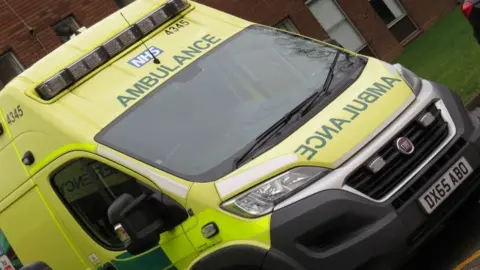Coronavirus: Over 300 patients refuse ambulance over Covid-19 fears
 BBC
BBCMore than 300 patients with severe illnesses refused to be taken to hospital by ambulance because of fears over coronavirus, a health chief said.
Toby Lewis, chief executive of Sandwell and West Birmingham NHS Trust, said hospitals are now "much clearer" about how to manage the infection.
The number of cases related to patients visited by West Midlands Ambulance Service in early April.
A new service will be put in place next week to make sure a follow-up is made.
Speaking at the weekly West Midlands Combined Authority briefing, Mr Lewis said it was important not to give people with acute conditions the sense it is "more risky" to go to hospital than to stay at home.
"We are open for people who do not think they have Covid-19, but they may be concerned about a stroke, a heart attack...
"Over 300 patients in the last little while, who were asked by an ambulance crew to go to hospital, declined to be transported.
"We are following up each of those individuals to make sure they are being looked after.
"But it's really important that in the messaging about social distancing and staying at home, we do not create a sense that it is more risky to go to hospital than it is to nurture your condition and become progressively more unwell."

- A SIMPLE GUIDE: How do I protect myself?
- AVOIDING CONTACT: The rules on self-isolation and exercise
- HOPE AND LOSS: Your coronavirus stories
- LOOK-UP TOOL: Check cases in your area
- STRESS: How to look after your mental health

The Local Democracy Reporting Service said Mr Lewis' comments follow the news Birmingham City Councillor Mohammed Aikhlaq MBE was too scared to call 999 because two close friends with the illness had died after being admitted.
The 60-year-old father-of-two, who has heart problems, diabetes and high blood pressure, became ill with a sore throat and coughing after returning to Birmingham following a four-week trip to Pakistan.
His symptoms became worse and he went on to develop breathing problems.
He was advised to stay in isolation but to call 999 if it got worse, but said he did not want to go to hospital.
At one point he was on the verge of calling his daughter to say goodbye, he said, but after a month of isolation he has made a slow recovery.

Follow BBC West Midlands on Facebook, Twitter and Instagram. Send your story ideas to: [email protected]
